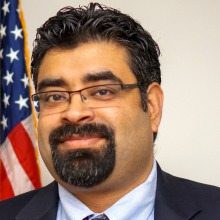
WashingtonExec 2016 Market Outlook Series
We look forward to a new year and new opportunities for innovation and growth in the government contracting community. This past year, we experienced an increased emphasis on cybersecurity, merger and acquisitions, the internet of things and doing more with less.
WashingtonExec reached out to those most knowledgeable and experienced in the federal contracting space. We asked executives in and around the beltway for insight regarding where they see the government contracting community headed in 2016. Topics discussed include M&A activity, cloud computing, privacy issues, data collection, healthcare IT, defense and more.
Amit Puri, President & CEO of Ingenicomm, Inc. kicks off our annual series.
WashingtonExec: What will this year hold for government contracting?
Amit Puri: I anticipate that 2016 will continue the era of commoditized service providers struggling with slim margins and needing to consolidate with similar providers to achieve economies of scale. At the same time, we’ll see specialized service providers in niche markets continuing to achieve healthy margins as we begin to see some normalcy return in the form of stabilizing Federal budgets.
WashingtonExec: What future collaboration will take place between industry and government in addressing tough issues?
Amit Puri: The budget cuts of recent years have left many government agencies struggling with the traditional approach to technology acquisition, where agencies purchase off-the-shelf solutions and then adapt them. Agencies now want to participate in collaborative technology development from the start, in order to avoid buying something that doesn’t really meet their needs, and then having to pay the vendor to tweak it after the fact. I expect that agencies will increasingly push for open architectures and frameworks that allow end users to add or change capabilities as their needs evolve without having to go back to the original system providers.
WashingtonExec: Where do you see a potential for fusing technologies with modern business practices to better the efficiency of government?
Amit Puri: The key to increased efficiency is modularity, both from a technology standpoint and a process one. Modular solutions provide great flexibility to meet both unique short-term requirements and evolving long-term needs, while also allowing for rapid roll-out and virtually turn-key transition to operations that reduces costs and technical risks. Modularity also reduces the cost of vendor lock-in, particularly when open, modular frameworks that allow customers to develop and integrate new capabilities are used.
WashingtonExec: What makes you most excited about the future of the GovCon space? What concerns you the most when looking ahead at the future of GovCon?
Amit Puri: Highly specialized companies now have more opportunities than ever before to leverage their expertise to achieve greater returns. Such companies excel because they have significant differentiators within their market space. For example, we’ve found our niche in providing next-generation products and non-conflicted services in the satellite ground station market; the amalgamation of the two allows us to provide superior solutions to our customers.
In the government services sector, the increasingly cut-throat, low-margin environment means that many smaller companies – particularly those providing non-specialist support – are focused on simply surviving. In the coming years, they will need to specialize within the market, or risk being pushed out by bigger players who are able to more effectively leverage economies of scale.
At the same time, the name of the game is shifting from top-line to bottom-line; while demonstrating breadth of customers and contracts through top-line numbers is still important, companies will need to work on their bottom line and increase efficiencies to become more appealing to the market.
WashingtonExec: How would you describe your business strategy during the past three to five years, and what is your organization’s plan for growth for next year? How has your business been able to grow as the federal market contracts?
Amit Puri: We find ourselves very lucky to be admired by our partners and customers due to the fact that we’ve built our organization to be a technical leader in a highly specialized market. Our focus has always been on supporting our customers by solving their most challenging technical problems – often no small feat in the government aerospace sector – and we’ve been able to attain a very healthy rate of financial growth as a result.
In the coming year, we’re looking to continue aggressively growing both our services and products businesses. On the services side, our increased footprint now allows us to pursue much larger contracts for system development, maintenance, and operations across a number of key agencies. On the product side, we’re actively pursuing new technology development, with a particular focus on the rapidly expanding small satellite sectors. We’ve established a technology development roadmap that will allow us to provide a complete portfolio of turn-key small satellite ground and flight systems.


